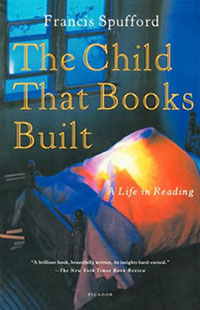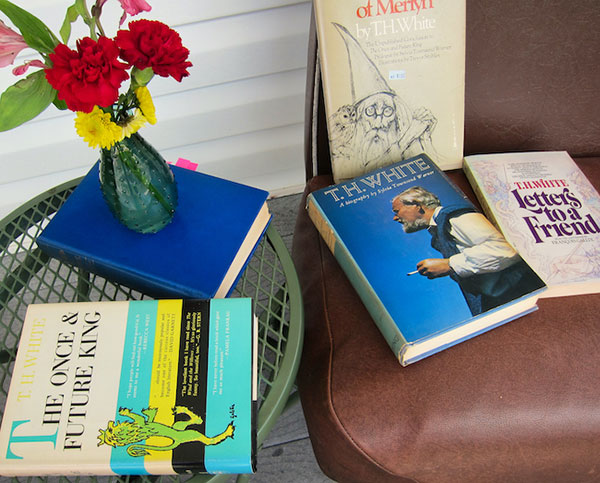As I write this, it’s August and school districts around the country are struggling to manage the 2020 fall term. Online, in-person, a hybrid? I understand all concerns and am glad I don’t have grandchildren during this pandemic. Yet I suspect a lot of children wish classes would start normally. As a kid, I couldn’t wait until the first day of school — a fresh beginning, when the heat and green of summer make way for red plaid bookbags and corduroy jumpers.
 Using computers in school isn’t new. What is new is remote learning in an age when information increasingly is being acquired from devices. In The Child That Books Built, avid reader Francis Spufford says, “In a world washed to and fro by glassy floods of representations, I choose to gaze at experience through the mesh of paragraphs.”
Using computers in school isn’t new. What is new is remote learning in an age when information increasingly is being acquired from devices. In The Child That Books Built, avid reader Francis Spufford says, “In a world washed to and fro by glassy floods of representations, I choose to gaze at experience through the mesh of paragraphs.”
Me, too. After buying a $5 school bus seat at a yard sale, I opened Porch School. Porch School starts with a walk, breakfast, then choosing the day’s materials: a journal, current work, books from my personal library. Porch School gets me outside, away from glassy floods of bad news, and lifts me from depression. As Merlyn advises the future King Arthur in T.H. White’s The Sword in the Stone, “The best thing for being sad is to learn something. That’s the only thing that never fails. … Look what a lot of things there are to learn.”

White learned a lot of things writing The Sword in the Stone. As he confided to his former Cambridge tutor, “I somehow started writing a book … I am afraid it is rather warm-hearted — mainly about birds and beasts. It seems impossible to determine whether it is for grown-ups or children.” Thank heavens White just barreled on without worrying about audience. Published in 1938, Sword was the first book in his masterpiece, The Once and Future King. White’s vision of the Arthurian saga was inspired by Thomas Malory’s Le Morte d’Arthur.
Terence Hanbury White had less than kingly beginnings. Born in Bombay in 1908, his colonial childhood ended when he was sent to England to attend a brutish boarding school. Upon graduation from Cambridge, he taught English in a prep school where his methods included reciting Wilfred Owens’ poetry and searching for grass snakes (though not at the same time). Always restless, White left teaching to write. He rented a Victorian gamekeeper’s cottage in the woods and expanded his solitary life with two badgers, a tawny owl, a goshawk, and an Irish setter.
White strayed from Malory’s story to give young Arthur a childhood. And what a childhood! Arthur’s tutor was Merlyn. The classroom? Nature, but with a magical twist. Merlyn knew the boy, called the Wart, would one day be king and required more than sums and letters to prepare him. “Education is experience, and the essence of experience is self-reliance,” Merlyn says when he changes the Wart into a fish. The Wart learns how to swim, not as a boy turned into a fish, but as a fish, a lesson that saves him from being a pike’s dinner.
Subsequent seminars include being changed into an ant (to know about totalitarianism), a wild goose (to understand why peace is better than war), an owl (to learn the wisdom of trees, rocks, and stars), and a badger (to realize the love of home). My favorite lesson was taught by a grass snake, “a piece of olive lightning.” The Wart asked to be turned into a snake so he too could be “dry and delicately rough and liquid power.”
The snake teaches him to Dream. When snakes hibernate, they Dream about History or Legends. He tells the Wart the History of the ancient, mighty reptiles from which they are descended. History, the Wart learns, is always sad, yet everyone needs musings to keep themselves company. “‘Is it a good thing to muse?’” asks the Wart. “‘Well, it passes the time,’” the snake replies. “Even H. sapiens has museums …’” Where one can find bones of Dinosauria.
In Porch School, I read about dinosaurs, Dunkirk, and dark matter. I watch the creatures around me — heavy-bodied cicadas like Huey helicopters, shark-like hornets, song sparrows that toss arias into the sky like loose sheet music, and a frog that does not croak or go ribbit, but speaks in complete sentences to the frog at the other end of the ditch. Porch School allows me to muse for hours but, oh, how I long for a teacher. There is still so much to learn. I would start with becoming a frog so I could join their conversation.
